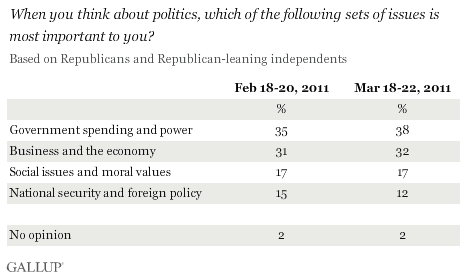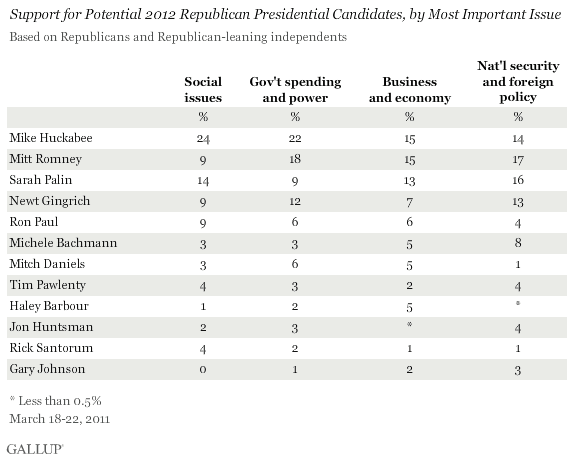PRINCETON, NJ -- Republicans continue to say government spending and power is the issue of greatest political importance to them (38%), followed closely by business and the economy (32%). Social and moral issues and foreign policy each have constituencies, but are far less important within the party. Republicans' ratings of these priorities are not substantially changed from a month ago. The lack of change in the perceived importance of foreign affairs is notable given the recent high-profile U.S. military involvement in Libya.

Gallup initially divided Republicans into these four "issue voting groups" in mid-February, and updated the procedure in interviewing with 1,082 Republicans and Republican-leaning independents March 18-22.
Huckabee Maintains Strength Across Issue-Based Voter Segments
As was the case in February, Republicans' choice of most important political issue is related to their support for potential Republican presidential candidates.
Mike Huckabee, who is the overall leader among Republicans for the 2012 nomination at this point, leads or ties for the lead among three of the four issue-based GOP groups. He slightly lags Mitt Romney and Sarah Palin among national security- and foreign policy-focused Republicans.
Romney, second overall in GOP 2012 preferences, ties for or is in first place among two out of the four groups, and is in second place among another group.

Among the large group of Republicans whose main political focus is on government spending and power, Huckabee and Romney get the most support, followed by Newt Gingrich and then Palin.
Republicans who choose business and the economy as their top issue are most likely to support Romney or Huckabee, followed closely by Palin. Romney, who has a Harvard MBA and significant business experience, would be expected to do well in this category.
Republicans who care the most about social and moral issues are most likely to support Huckabee and Palin. All other candidates gain only single-digit support among these voters. Romney, who is in first or second place among all other groups, does no better than tie Gingrich and Ron Paul among social issues voters.
Despite some observers' claims that Michele Bachmann and Rick Santorum have a special following among social conservatives, these two politicians do not have an unusual appeal among Republicans who care most about social and moral issues.
The smaller group of Republicans whose main focus is on foreign affairs spread their support across the four candidates who lead overall -- Romney, Palin, Huckabee, and Gingrich. Bachmann receives her highest support (8%) among this group.
Implications
As was the case in mid-February, the two biggest issues for Republican voters nationwide are government power and spending, and the economy -- in that order. The rank-order of these issue segments appears to be generally stable, with only minor shifts since last month's update.
Republican front-runner Huckabee maintains his relative position of strength across all four issue groups. He dominates among social issues voters and leads or ties other potential candidates in the two biggest Republican issue groups -- those focused on government spending and power, and those focused on the economy.
Romney maintains a first- or second-place position among all segments except social issues voters. Palin appears to have a relative weakness among the largest segment of Republicans -- those who are focused on the government.
Bachmann, who has the second-highest Positive Intensity Score of any potential Republican candidate at this point, does slightly better among that small group of Republicans most focused on foreign affairs. Tim Pawlenty, in the news last week after he established a presidential exploratory committee, does not do exceptionally well among any of the four issue groups. Haley Barbour, who is also reportedly giving serious consideration to a run for the GOP nomination, does best among Republicans focused on business and the economy.
Survey Methods
Results for this Gallup poll are based on telephone interviews conducted March 18-22, 2011, on the Gallup Daily tracking survey, with a random sample of 1,082 Republicans and Republican-leaning independents, aged 18 and older, living in all 50 U.S. states and the District of Columbia, selected using random-digit-dial sampling.
For results based on the total sample of Republicans, one can say with 95% confidence that the maximum margin of sampling error is ±4 percentage points.
Interviews are conducted with respondents on landline telephones and cellular phones, with interviews conducted in Spanish for respondents who are primarily Spanish-speaking. Each daily sample includes a minimum quota of 200 cell phone respondents and 800 landline respondents, with additional minimum quotas among landline respondents for gender within region. Landline respondents are chosen at random within each household on the basis of which member had the most recent birthday.
Samples are weighted by gender, age, race, Hispanic ethnicity, education, region, adults in the household, cell phone-only status, cell phone-mostly status, and phone lines. Demographic weighting targets are based on the March 2010 Current Population Survey figures for the aged 18 and older non-institutionalized population living in U.S. telephone households. All reported margins of sampling error include the computed design effects for weighting and sample design.
In addition to sampling error, question wording and practical difficulties in conducting surveys can introduce error or bias into the findings of public opinion polls.
View methodology, full question results, and trend data.
For more details on Gallup's polling methodology, visit www.gallup.com.
